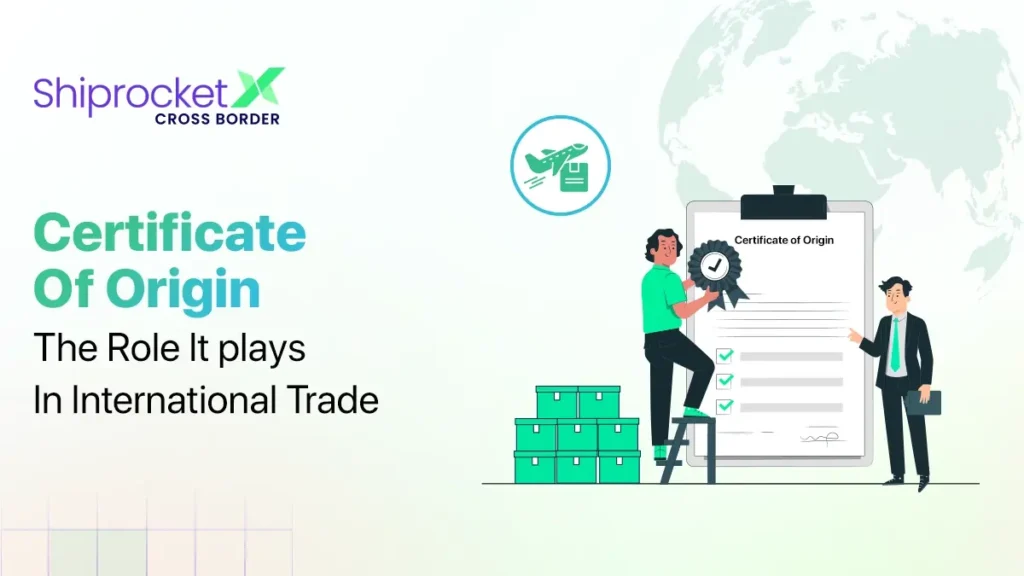Certificate of Origin: Validating Product Source and Authenticity
- The Meaning of Certificate of Origin
- Certificate of Origin: Different Types
- Contents of a Certificate of Origin
- Understanding the Significance of Certificate of Origin
- The Issuers of Certificate of Origin
- Essential Documents Needed for Obtaining Certificate of Origin
- Obtaining a Certificate of Origin: Step-by-Step Process
- Why Your Business Need a Certificate of Origin?
- Conclusion
A certificate of origin (CO) is provided to ascertain the legitimacy of imports. It is necessary to produce this document during international trade where goods need to cross different borders and move through countries with varied rules and regulations. This legal document helps ensure fair trade practices by protecting the rights of those involved in the process. This article discusses the types, importance, and other relevant information about the certificate of origin. Let’s get started!

The Meaning of Certificate of Origin
A certificate of origin (CO) is an essential document that serves as proof of a product’s nationality. It is needed during customs clearance in international trade. It verifies that the trading is being done in compliance with the accepted customs and tariff regulations. It serves as an assurance that the goods being traded are not illegal. By producing this certificate, traders verify that the goods aren’t from a country bound by trade restrictions or one that indulges in unethical manufacturing processes. Moreover, the certificate assesses eligibility for preferential treatment based on the trade agreements. Based on this certificate, the customs officer decides the duties to be paid on the goods. If the exported or imported goods do not come along with a CO then they are not given customs clearance and cannot leave the warehouse.
Certificate of Origin: Different Types
There are mainly two types of certificates of origin. These are as follows:
- Preferential Certificate of Origin
Items that come under a free-trade agreement for reduced tariffs or exemptions are given a preferential certificate of origin. They are usually associated with Regional Trade Agreements.
- Non-Preferential Certificate of Origin
It is awarded to goods that do not qualify for tariff-free treatment or whose tariffs cannot be reduced as per the trade agreement between countries. Also known as an ordinary certificate of origin, it is used when an exporting country has not signed a trade agreement with the importing country. Any product that does not form a part of the tariff relief should also be accompanied by an ordinary certificate of origin.
Contents of a Certificate of Origin
Let us now take a look at the information included in the certificate of origin:
- Detailed information about the products along with their unique codes
- The size, quantity, and weight of the item
- Name, country of origin, and contact information of the manufacturer
- Name of the importing agent in addition to their contact information
- Name of the exporting agent in addition to their contact information
- Bill of lading or waybill number
- Information about the mode of transportation
- Information related to the route to be followed
Understanding the Significance of Certificate of Origin
Why is a certificate of origin required? Here is a quick look at the various reasons:
- It is a declaration that the shipment fulfils the customs requirement of the country where the goods are being shipped.
- They help the customs officer decide the duty to be paid for the shipment.
- It also helps determine whether the goods qualify for tariff reduction or any kind of exemption. Goods belonging to specific categories or traded between certain countries may qualify for the same. They are accompanied by a preferential certificate of origin.
The Issuers of Certificate of Origin
In India, a CO is issued by two prominent bodies. These are:
- Indian Chamber of Commerce
- Trade Promotion Council of India
Exporters in India must submit their requests to get this document issued from the aforementioned bodies to prove that the goods being exported are manufactured in India. It should be duly signed and stamped by the Chamber of Commerce or another authority possessing similar qualifications. It certifies that the items exported by them are completely obtained and manufactured in India. The exporter must sign a CO with a permanent indemnity bond. This must be done on a non-judicial stamp paper, duly notarised.
Essential Documents Needed for Obtaining Certificate of Origin
Here is a look at the various documents required for acquiring the Certificate of Origin:
- Commercial Invoice – A detailed copy of the invoice must be attached to show what is included in the shipment. It must include the prices of each item.
- Digital Signature Certificate – This is required at the time of submitting your application online.
- Packaging List – This document includes the contents of each package, the way it is packed, and its weight.
- Cover Letter – A cover letter is required for the issuance of the certificate of origin.
- Bill of Lading – This is the receipt from the shipping company that includes information related to the person sending and receiving the shipment along with its destination.
- Import Export Code – The unique code assigned for the purpose of import and export must be attached.
- Manufacturer Exporter Declaration – This includes information about the items that need to be submitted. The document needs to be submitted at the port.
- Purchase Order from Importer – Importer or the buyer must send the purchase order to the supplier to authorise a purchase. It should include the list of products that are to be bought.
Obtaining a Certificate of Origin: Step-by-Step Process
You can obtain a certificate of origin online as well as in person. We have shared the step-wise procedure for both methods to ease the task for you:
In-Person
- Visit the Chamber of Commerce office near your place to get the form for the certificate of origin.
- Fill out the form and submit it at the office along with the necessary documents. You are required to share your shipment’s information, which would include the details about the importer and exporter, country of origin, the description of goods, and relevant product codes among other things.
- Your application shall be reviewed by the officials at the Chamber of Commerce.
- They will approve your application and issue the CO if you fulfill the criteria.
Online Methods
- As an exporter, you are required to log in to the chamber of commerce’s online platform and register with an accredited chamber of commerce.
- Thereafter, you can log in to the chamber’s online platform and submit your application to receive the certificate of origin. You must provide complete information about your shipment as a part of the application.
- Your application along with all the details and documentation shall be reviewed by the chamber of commerce. The authority will assess and verify whether you have followed all the international rules and regulations.
- If you meet the criteria, the chamber of commerce will approve your application and issue an electronic certificate of origin.
The customs authorities in the country of import verify the genuineness of the certificate of origin. They also check its validity by using a unique identification number. This can also be done by scanning the QR code present on the certificate.
Why Your Business Need a Certificate of Origin?
Your business requires a certificate of origin for customs clearance. The certificate acts as an assurance that your products comply with the regulations of the country to which your items are being exported. Moreover, you need this certificate to determine the duty amount that needs to be paid.
Can One Produce Their Certificate of Origin?
A certificate of origin cannot be produced on one’s own. It is a legal document that is issued only by the Local Chamber of Commerce or Trade Promotion Council of India. You need to contact these authorities and follow the standard procedure for obtaining this certificate.
What is a Free Trade Agreement Certificate of Origin?
A Free Trade Agreement Certificate of Origin is issued if your shipment qualifies for FTA. This is a preferential CO that exempts or reduces the duties; thereby, allowing products to be sold at competitive rates. This certificate is optional and is not a mandatory document for customs clearance.
Certificate of Origin vs. Title
A CO provides information related to a product’s origin along with details about its export and import. It does not give a title about the legal transfer of ownership of an item. A title is obtained through a different transaction that mostly includes an invoice.
Conclusion
A certificate of origin is an important document for those involved in international trade. It includes a unique identification number. A QR code and other security elements are also mentioned on this certificate. It plays an important role during the customs clearance process. Failure to produce this document can result in issues during customs clearance. Your goods shall not be released if this document is missing. You can get this certificate issued by the Chamber of Commerce and the Trade Promotion Council of India by submitting a request through online or offline mode. Accredited companies are also authorised to draft these certificates on your behalf. Thereafter, they can get them certified by the chambers of commerce.






